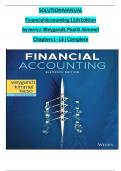SOLUTION MANUAL ll
Financial Accounting 11th Edition
ll ll ll
by Jerry J. Weygandt, Paul D. Kimmel
ll ll ll ll ll ll
Chapters 1 - 13 | Complete
ll ll ll ll ll ll
,TABLE OF CONTENTS ll ll
Chapter 1. Accounting in Action
ll ll ll ll
Chapter 2. The Recording Process
ll ll ll ll
Chapter 3. Adjusting the Accounts
ll ll ll ll
Chapter 4. Completing the Accounting Cycle
ll ll ll ll ll
Chapter 5. Accounting for Merchandising Operations
ll ll ll ll ll
Chapter 6. Inventories
ll ll
Chapter 7. Fraud, Internal Control and Cash
ll ll ll ll ll ll
Chapter 8. Accounting for Receivables
ll ll ll ll
Chapter 9. Plant Assets, Natural Resources and Intangible Assets
ll ll ll ll ll ll ll ll
Chapter 10. Liabilities
ll ll
Chapter 11. Corporations: Organisations, Stock Transactions and Stockholders’
ll ll ll ll ll ll ll
Equity
ll
Chapter 12. Statement of Cash Flows
ll ll ll ll ll
,Chapter 13. Financial Analysis: The Big Picture
ll ll ll ll ll ll ll
,CHAPTER 1 ll
Accounting in Action ll ll
ASSIGNMENT CLASSIFICATION TABLE l ll
Brief A
Learning Objectives ll Questions ll Exercises Do It!
ll Exercises Problems
1. Identify the activities ll ll 1, 2, 3, 4, 5
ll ll ll ll 1 1, 2ll
andusers associated with
ll l ll ll
accounting.
ll
2. Explain the building blocks of 6, 7, 8, 9, 10
ll ll ll ll ll ll ll ll ll 2 3, 4ll
accounting:
ll ethics, ll
principles,and assumptions.
ll l ll
3. State the accounting ll ll 11, 12, 13, 14.
ll ll ll 1, 2, 3, 4, 5
ll ll ll ll 3 5
equation, and define
ll ll ll 22
itscomponents.
ll l
4. Analyze the effects of business ll ll ll ll 15, 16, 18
ll ll 6, 7, 8, 9
ll ll ll 4 6, 7, 8
ll ll 1A, 2A, 4A,
ll ll
transactions on theaccounting
ll ll ll l 5A
equation.
ll
5. Describe the four financial ll ll ll
17, 19, 20, 21,
ll ll ll 10, 11 ll 5 8, 9, 10, 11,
ll ll ll 2A, 3A, 4A,
ll ll
statements and how they
ll ll ll ll
12, 13, 14, 15,
ll ll ll 5A
areprepared.
ll l
16, 17, 18
ll ll




